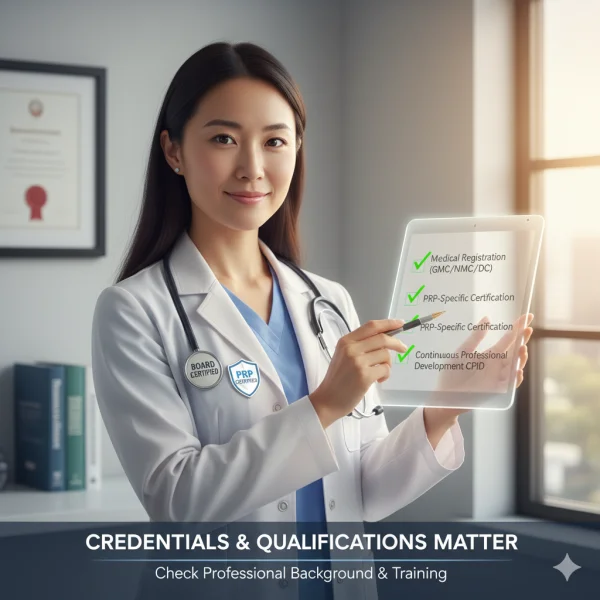You’ve probably seen PRP everywhere lately. From hair clinics on the high street to skin studios on Instagram, platelet-rich plasma therapy is being promoted as a natural solution for thinning hair, tired skin, or even aching joints. And it does hold promise. But here’s the catch: PRP isn’t plug-and-play. The same vial of plasma in the hands of two different individuals can yield either subtle, lasting results or little more than a bruise and dashed expectations.
That’s why the practitioner matters so much. Think about it. PRP involves drawing your blood, processing it through a centrifuge, and reinjecting it into delicate areas, such as your scalp, under-eyes, or even joints. It’s a medical-grade procedure, not a beauty treatment you can pick up in a salon add-on menu. Yet more and more clinics are advertising it without making clear who’s actually doing the injecting. A nurse prescriber with specialist training? Or a technician rushing through appointments? The difference isn’t slight.
For patients, the risk isn’t just financial. Poorly processed PRP can be weak and ineffective. Inadequate hygiene can lead to infection. A rushed or unqualified injector may not know how to tailor depth, dosage, or aftercare to your individual needs. On the other hand, a medically trained practitioner with genuine PRP experience can make the treatment safe, precise, and worthwhile for your investment.
This guide is designed to help you see past the marketing gloss. We’ll cover what credentials to look for, the questions worth asking, and the red flags that should have you walking straight back out the door.
So what exactly separates a trustworthy PRP provider from a risky one?
Our Preferred Partner - Cellenis PRP
Not all PRP systems are created equal — and the quality of preparation makes a big difference to outcomes. That’s why many leading clinics choose Cellenis® PRP, a clinically validated system designed to deliver highly concentrated, pure platelet-rich plasma every time. By using a closed, sterile kit and advanced centrifugation, Cellenis® ensures consistency, safety, and optimal platelet yield — the growth factors your skin, hair, or tissue rely on for regeneration. Whether the goal is brighter skin, fuller hair, or faster recovery, Cellenis® PRP offers practitioners and patients confidence in both the science and the results.
What Makes PRP So Practitioner-Dependent?
PRP (Platelet-Rich Plasma) therapy might seem straightforward - it uses your own blood. But don’t be fooled. The effectiveness and safety of PRP depend far more on the practitioner’s skill and experience than many people realise.
Expertise Determines Results - Not Just the PRP
Even the highest-quality PRP preparation can yield poor results in the wrong hands. Here’s why choosing a qualified, experienced practitioner matters:
- PRP is highly technique-sensitive
The injection's depth, angle, and precision influence how well the growth factors are delivered to the target tissue, whether skin, scalp, or joints. - Treatment must be tailored to the condition.
PRP for hair loss differs significantly from PRP for facial rejuvenation or musculoskeletal pain. A well-trained practitioner adapts the protocol accordingly. - Not all PRP is created equal.
Multiple preparation systems on the market (e.g., Cellenis®, MyCells®, RegenLab) produce different platelet concentrations. The practitioner’s knowledge of the equipment and how to optimise it for your needs is critical. - Double-spin vs. single-spin processing matters
How your blood is centrifuged affects the concentration of platelets and whether white blood cells are included (which can be inflammatory in cosmetic applications). Recent clinical guidance emphasises that the choice between single-spin and double-spin centrifugation techniques drastically affects platelet yield and quality, with double-spin methods typically producing higher concentrations crucial for optimal regenerative outcomes - Safe practice requires medical expertise.
Though PRP is autologous (from your blood), sterile technique is essential. A practitioner with clinical training will know how to minimise risk and handle complications if they arise. - Assessment and aftercare should be part of the package.
A reputable provider will assess your suitability, explain realistic outcomes, and provide tailored aftercare. They won’t promise “miracle” results or skip steps to cut corners.
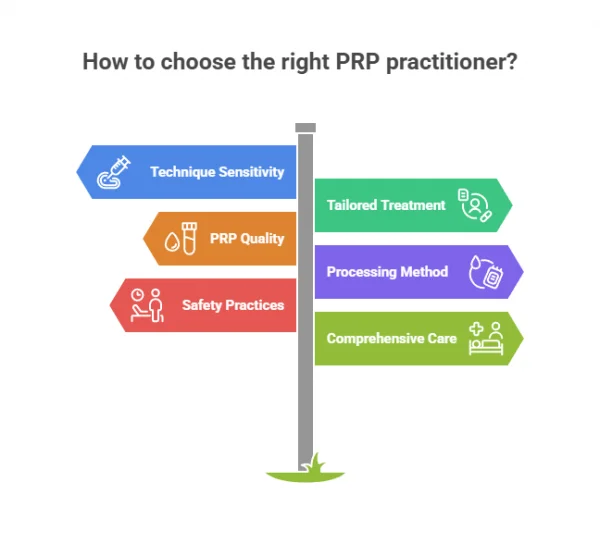
PRP therapy is not a plug-and-play treatment. The practitioner’s skill, judgement, and familiarity with the nuances of PRP delivery directly shape your outcome, whether that’s fresher skin, fuller hair, or faster recovery.
Red Flags: What To Avoid When Choosing A PRP Provider
While PRP therapy is generally safe, the quality of care varies significantly depending on who’s performing it. More clinics offering platelet-rich plasma treatments are separating well-trained professionals from those cutting corners. is essential
The NHS and the General Medical Council mandate that PRP treatments be performed by medically qualified professionals in sterile clinical environments to minimise risks such as infection.
Spotting the Warning Signs Early
These are the common red flags that suggest a PRP provider may not be operating to the highest standards:
- Overpromising and underexplaining
Be cautious if a clinic promises “miraculous results” or "instant transformations" without explaining how PRP works. Honest providers set realistic expectations and clearly discuss results, risks, and limitations. - Suspiciously low pricing
While shopping on cost is tempting, PRP involves specialised equipment and skilled technique. If a treatment is markedly cheaper than the regional average, ask what compromises are being made. - No mention of the practitioner’s qualifications
If you can’t find clear information on who’s administering the treatment, whether they’re medically trained, registered, or certified. - Lack of clinical hygiene or sterile process
PRP involves drawing and reinjecting blood. This must be done in a sterile, clinical-grade environment to prevent contamination. Avoid providers operating out of home salons or poorly maintained spaces. - No visible track record
A reputable provider will share before-and-after photos, patient testimonials, or case studies (with consent). If these are missing or feel too generic, it may suggest limited experience. - One-size-fits-all packages
Be wary of clinics offering “PRP bundles” without variation for skin, scalp, or joint concerns. A good practitioner will assess your needs and customise the treatment plan accordingly. - Pushy sales tactics
If you feel rushed into booking or pressured to buy multiple sessions upfront without a proper consultation, it’s worth reconsidering.
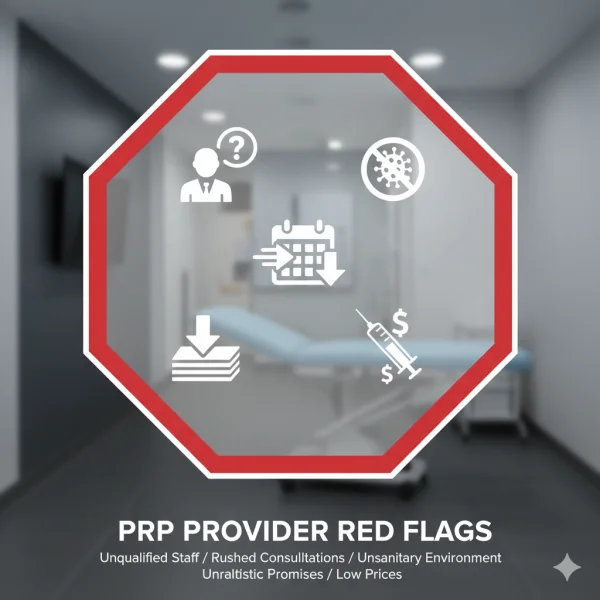
Choosing the wrong PRP provider isn’t just a waste of time and money - it can compromise your results or, worse, your health. Trust your instincts. If something feels off, it probably is.
The Must-Haves: How To Vet A PRP Practitioner Properly
Regarding PRP (Platelet-Rich Plasma) therapy, your results depend as much on who performs the treatment as on the treatment itself. Here’s how to ensure the practitioner you choose is qualified, competent, and capable of delivering safe, effective results.
Credentials and Qualifications Matter
Before anything else, check professional background and training.
- Look for medical registration.
Your practitioner should be a qualified medical professional - typically a doctor, nurse prescriber, or dentist - registered with the GMC, NMC, or GDC. - PRP-specific certification
They should have formal training in PRP techniques, ideally with accreditation from a recognised medical aesthetics provider. - Continuous professional development
Ensure they’re up to date with the latest techniques by checking for evidence of regular training or CPD activities in regenerative medicine.
Experience in the Area You’re Seeking Treatment
Not all PRP applications are the same.
- Ask about their focus.s
Do they specialise in PRP for skin rejuvenation, hair restoration, or orthopaedic conditions? You want someone with hands-on experience in the area you’re interested in. - Request before-and-after examples
Ethical practitioners will have a portfolio of real cases (with patient consent) to demonstrate results. - Enquire about the volume of procedures.
Experience isn’t just years on paper - ask how many PRP procedures they perform monthly or yearly.
Technology, Equipment, and Clinical Standards
Quality treatment depends on both the practitioner and the tools they use.
- Ask about the PRP system used
Brands like Cellenis®, RegenLab, and MyCells® offer reliable preparation systems. Cheaper kits can deliver inconsistent results. - Single-spin vs double-spin preparation
Practitioners should be able to explain which technique they use and why - this affects platelet concentration and outcomes. - Clinical-grade environment
Ensure the procedure is done in a hygienic, medically regulated space, not a beauty salon or home setup.
Consultation Quality and Transparency
A proper consultation should never feel like a sales pitch.
- Tailored advice, not templated scripts.
The practitioner should take time to understand your needs, medical history, and expectations before recommending treatment. - Transparent explanation of outcomes and risks
You should leave knowing the benefits, the risks, the likely results, and the limits of PRP therapy. - Transparent pricing and follow-up plans
Look for clear costs with no hidden extras, and an aftercare plan that supports your recovery and tracks your progress.
Finding the right PRP provider isn’t just about credentials - it’s about care, competence, and communication. Ask questions, trust your instincts, and don’t fear walking away if something feels wrong.
Questions You Should Always Ask Before Committing
Before saying yes to PRP therapy, you must feel informed and confident in your provider’s expertise. A good practitioner welcomes questions and provides clear, honest answers, without pressure. Here’s how to approach your consultation like a well-prepared patient.
Ask the Right Questions to Protect Your Results and Safety
Whether you're seeking PRP for skin, hair, or healing, these are the non-negotiables to cover in your consultation:
- Who will perform the treatment?
Confirm that your practitioner is medically trained, licensed, and experienced in PRP procedures, especially in your chosen treatment area. - How many PRP procedures do you perform regularly?
Volume speaks volumes. You want someone who performs this treatment frequently and confidently, not occasionally. - What PRP system do you use, and why?
Ask what brand or preparation method is used (e.g. Cellenis®, RegenLab) and how it’s chosen for your specific concern. - Do you use single-spin or double-spin centrifugation?
How blood is processed can impact platelet concentration and overall efficacy - your practitioner should know the difference and explain why their method matters. - How is sterility maintained during treatment?
This is particularly important since PRP involves injections. The answer should include the use of equipment, proper PPE, and a clinical setting. - What results should I realistically expect?
A credible provider will set appropriate expectations and explain how many sessions are needed to see visible improvements. - What are the risks or side effects?
All treatments carry potential risks. A professional should walk you through possible reactions like bruising, swelling, or rare complications. - What does aftercare involve?
Ask what happens post-procedure - what to avoid, how to care for the area, and when to return for follow-up. - How much will it cost in total?
Get a full breakdown of the costs, including any follow-up appointments or packages. Avoid clinics that are vague on pricing.

These questions aren’t just about due diligence - they help ensure your treatment is safe, personalised, and likely to deliver the results you’re hoping for. If a clinic can’t - or won’t - answer these with clarity and confidence, it’s worth exploring other options.
Final Thoughts: Confidence Over Convenience
Choosing the right PRP provider is more than securing an appointment or chasing the best price. It’s about trusting your face, hair, or health to someone with the skill, care, and integrity to treat you safely and effectively. When it comes to PRP therapy, taking shortcuts can lead to disappointing - or even damaging - results.
Choose Thoughtfully, Not Hastily
Investing time in your decision-making now protects your health and enhances your results later. Here’s why it matters:
- You deserve personalised treatment
A well-qualified practitioner will tailor the approach to your needs, not sell you a one-size-fits-all package. - PRP outcomes are practitioner-dependent
The effectiveness of PRP is tied to expertise. A reputable provider understands platelet concentration, injection techniques, and post-treatment care. - Transparency builds trust
Suppose a provider is open about their process, equipment, and experience. If they’re evasive or vague, it’s not worth the risk. - Low-cost shortcuts often mean compromised care.
Clinics that cut costs may compromise sterile technique, equipment quality, or aftercare support - none of which you should gamble on. - You’ll feel more confident going in.
Feeling informed and empowered makes the treatment experience smoother, safer, and more satisfying from start to finish.
Your Outcome Starts with Your Choice
PRP has enormous potential - but only when appropriately delivered. Take your time, ask questions, and trust your instincts. Your skin, scalp, or joints will thank you for it.
Conclusion
Choosing a PRP practitioner isn’t just a box to tick - it’s a decision that directly impacts your safety, satisfaction, and results. From understanding how PRP works to recognising red flags and asking the right questions, it’s clear that expertise, transparency, and clinical standards are non-negotiable.
Your confidence should begin long before the first injection. Whether you're exploring PRP for rejuvenation, hair loss, or healing, the right practitioner won’t just perform the treatment - they’ll guide, inform, and support you every step.
If you’re ready to explore your options, take the time to consult with a medically qualified, PRP-trained specialist in your area. Ask the hard questions. Trust your instincts. And remember: when it comes to your health and appearance, informed decisions always lead to better outcomes.
Your PRP Questions
Real Questions from Real People — Answered
Straightforward answers to the questions people like you are asking right now about PRP.

Cost of PRP treatment for hair?
Please give the cost and how many sessions needed to prevent complete hair loss and new hair
Hair loss.
Dear reader My name is Mo I'm interested to have prp treatment in your clinic and I have some questions How many ml of prp i will get injured ? Did you analyse prp There any other services after the treatment is done Thank you
To view all the PRP questions, please click here.
Or click here to ask your own question.
Find A Verified Clinic
Trusted PRP Experts, Local to You
Easily connect with qualified, verified professionals for safe, reliable treatment.

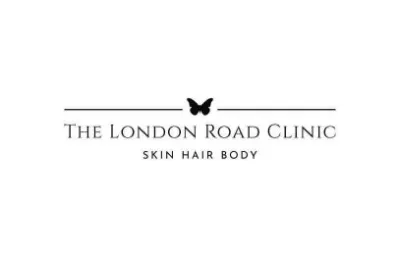
The London Road Clinic
65 London Road, Newark, NG24 1RZ
Our mission is simple: deliver safe, ethical, and effective treatments to help you feel your best.
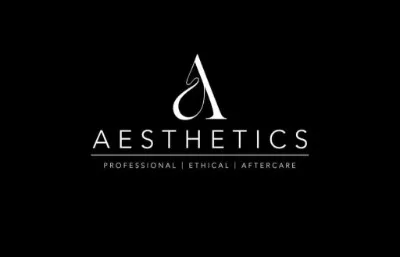
A Aesthetics
50 VICTORIA GATE, DERRY, BT47 2TP
To find a PRP clinic near you, please click here.



